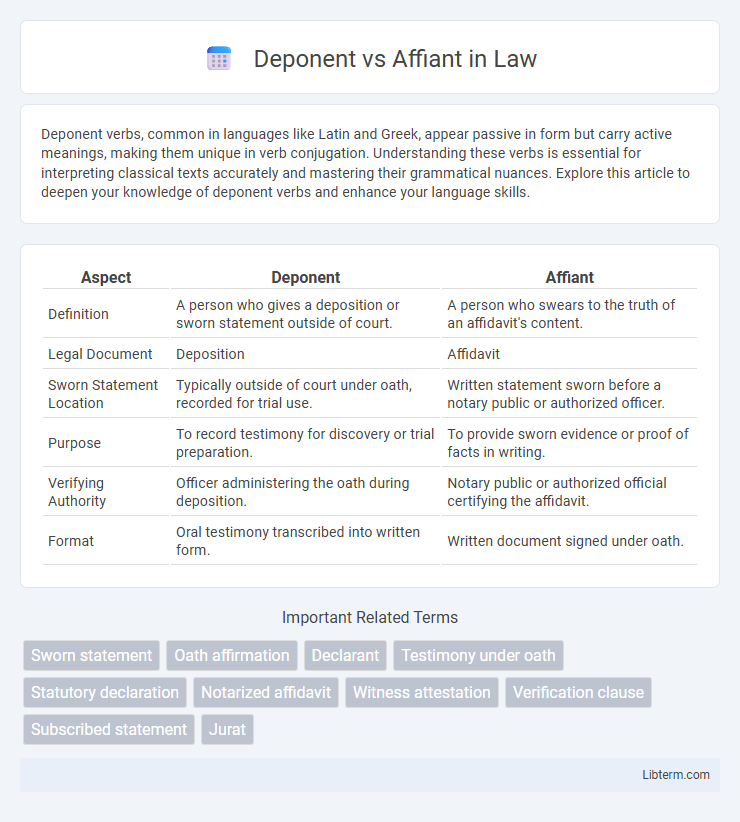Deponent verbs, common in languages like Latin and Greek, appear passive in form but carry active meanings, making them unique in verb conjugation. Understanding these verbs is essential for interpreting classical texts accurately and mastering their grammatical nuances. Explore this article to deepen your knowledge of deponent verbs and enhance your language skills.
Table of Comparison
| Aspect | Deponent | Affiant |
|---|---|---|
| Definition | A person who gives a deposition or sworn statement outside of court. | A person who swears to the truth of an affidavit's content. |
| Legal Document | Deposition | Affidavit |
| Sworn Statement Location | Typically outside of court under oath, recorded for trial use. | Written statement sworn before a notary public or authorized officer. |
| Purpose | To record testimony for discovery or trial preparation. | To provide sworn evidence or proof of facts in writing. |
| Verifying Authority | Officer administering the oath during deposition. | Notary public or authorized official certifying the affidavit. |
| Format | Oral testimony transcribed into written form. | Written document signed under oath. |
Understanding the Terms: Deponent and Affiant
A deponent is an individual who provides sworn testimony outside of court, typically recorded during a deposition, while an affiant is a person who makes a sworn statement in an affidavit. Both terms relate to legal declarations under oath, with deponents offering evidence orally and affiants providing written assertions verified by oath or affirmation. Understanding these distinctions is crucial for interpreting the roles and formats of sworn legal documents.
Legal Definitions of Deponent and Affiant
A deponent is a person who provides sworn testimony outside of court, typically during a deposition, under oath and subject to cross-examination for legal proceedings. An affiant is an individual who swears to the truthfulness of a written statement or affidavit, attesting to facts under oath before a notary or authorized official. Both roles involve sworn statements, but a deponent's testimony is usually oral and recorded, while an affiant's statement is documented in writing.
Key Differences Between Deponent and Affiant
A deponent is an individual who provides testimony under oath during a deposition, primarily in pre-trial discovery, whereas an affiant is a person who makes a written affidavit declaring facts to be true. The key difference lies in the format: deponents give oral evidence recorded by a court reporter, while affiants submit sworn statements in writing. Both roles require an oath or affirmation to ensure truthfulness, but the context and method of delivering testimony distinguish them.
Contexts Where "Deponent" is Used
The term "deponent" is primarily used in legal contexts related to depositions, where an individual provides sworn testimony outside of court, often during pre-trial discovery. Unlike an affiant, who makes a sworn statement or affidavit without the presence of opposing counsel, a deponent's testimony is recorded for use at trial and subject to cross-examination. The role of a deponent is crucial in civil litigation, where detailed and sworn evidence is gathered to support or contest claims before a judge or jury.
Contexts Where "Affiant" is Used
An affiant is a person who makes a sworn statement or affidavit under oath, typically in legal or administrative proceedings, such as court cases, property transactions, or official declarations. This term is commonly used in contexts requiring formal written testimony to verify facts or claims, including affidavits for evidence submission or notarized declarations. Unlike a deponent, who provides oral testimony under oath during depositions, an affiant's role centers on written, sworn affidavits used to support legal arguments or document factual assertions.
Roles and Responsibilities of a Deponent
A deponent provides sworn testimony under oath during a deposition, answering questions related to a legal case outside of the courtroom. Their primary responsibility is to give truthful, accurate, and complete answers to the attorney's questions, which are recorded and can be used as evidence. Unlike an affiant who submits a written affidavit, a deponent participates in live questioning and may be cross-examined, ensuring their statements are subject to immediate scrutiny.
Roles and Responsibilities of an Affiant
An affiant is an individual who provides a sworn written statement or affidavit, affirming that the information contained is true to the best of their knowledge, whereas a deponent typically delivers oral testimony under oath during a deposition. The primary responsibilities of an affiant include accurately declaring facts, verifying the authenticity of documents referenced, and understanding that false statements may lead to legal penalties such as perjury. Affiants must sign the affidavit in the presence of a notary public or authorized official to ensure the statement's legal validity and admissibility in court proceedings.
Legal Documents Involving Deponents vs Affiants
Legal documents involving deponents primarily pertain to depositions, where deponents provide sworn testimony under oath for use in court proceedings. Affiants, on the other hand, are individuals who make sworn affidavits, which are written statements confirmed by oath or affirmation for use as evidence. Distinguishing between deponents and affiants is crucial in litigation, as depositions allow for oral examination and cross-examination, whereas affidavits serve as static written evidence.
Importance in Legal Proceedings
Deponents provide sworn testimony recorded during depositions, playing a critical role in gathering evidence before trial, which helps shape case strategy and preserve witness accounts. Affiants submit written affidavits under oath to support motions or establish facts without live testimony, offering a swift and reliable means to present evidence. Both roles ensure the integrity of factual statements, with deponents emphasizing oral evidence and affiants contributing verified documentary proof crucial in legal decision-making.
Choosing the Correct Term: Deponent or Affiant
Choosing the correct term between deponent and affiant depends on the context and nature of the legal statement involved. A deponent refers specifically to a person who gives testimony under oath during a deposition, while an affiant is someone who provides a sworn affidavit as a written statement of facts. Accurate use of these terms ensures clarity in legal documents and proper adherence to procedural protocols.
Deponent Infographic

 libterm.com
libterm.com